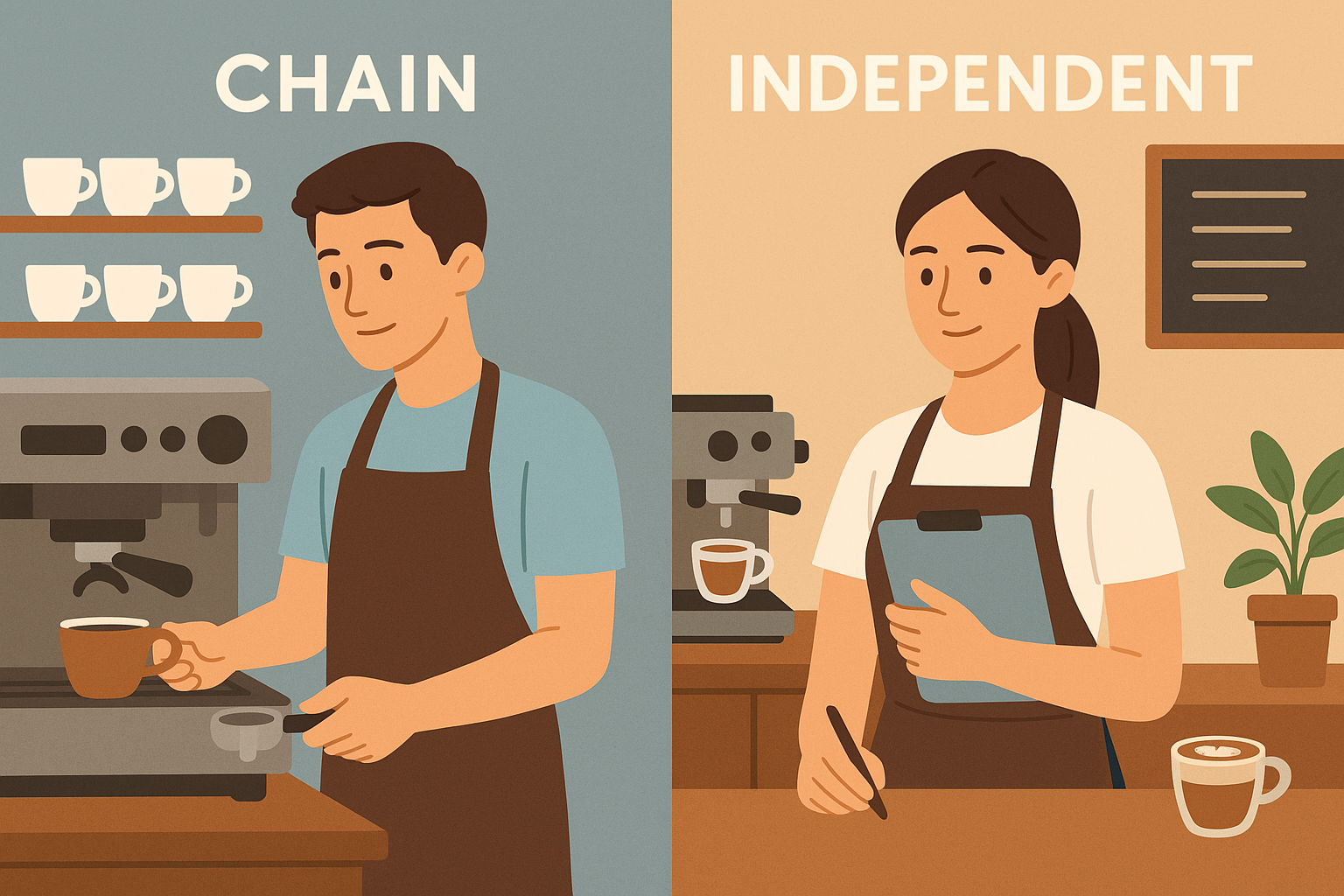If you’re starting your journey as a barista or thinking about switching cafés, one big decision is where you want to work: a big-name chain like Starbucks, Costa, or Tim Hortons — or a small, independent coffee shop that operates locally and often more creatively.
Both types of workplaces offer valuable experience, but they’re very different environments. The best choice depends on your personality, goals, and how you want to grow within the coffee world.
In this article, we’ll break down the key differences between working at a chain and at an independent café — so you can make a smart, informed decision about your barista path.
1. Training Style: Structured vs. Hands-On
At a Chain:
Chains offer structured training programs with detailed manuals, step-by-step drink guides, videos, and standardized procedures. You’ll often go through a formal onboarding process and get certified on drink stations.
- You’re trained to follow the system exactly
- Everything has a formula: timing, recipe, service steps
- There’s often less flexibility in how you do things
✅ Great for beginners who want consistency and clear rules
❌ Not ideal if you want freedom to experiment
At an Independent Café:
Training is usually more personal and hands-on, often with one-on-one shadowing and informal instruction.
- You learn directly from experienced baristas
- Recipes may be flexible or change seasonally
- You’re expected to adapt and pick things up quickly
✅ Great for creative thinkers and fast learners
❌ Can be overwhelming without structure
2. Menu and Recipes: Standardized vs. Specialty
Chains:
Chain menus are typically large, detailed, and standardized globally. Your caramel macchiato in New York will taste the same as the one in Tokyo — that’s the goal.
- Drinks are often pre-portioned or use automatic machines
- Flavored drinks and seasonal promotions are common
- Less emphasis on coffee origin, roast profile, or brewing methods
✅ Easy to follow, no need to reinvent the wheel
❌ Less focus on craft or third-wave techniques
Independents:
Menus tend to be smaller, more curated, and driven by the café’s personality or coffee philosophy.
- You might serve single-origin beans and rotate offerings
- Manual brew methods (pour-over, Chemex, AeroPress) are more common
- You’re expected to know more about the coffee itself
✅ Ideal for coffee lovers who want to develop deep knowledge
❌ You’ll need to do more studying and tasting
3. Work Environment: Corporate vs. Community
Chains:
Chain cafés operate like mini corporations. There are clear roles, uniforms, and policies. Everything is part of a bigger brand system.
- You’ll work with a larger team
- Roles are more specialized (bar, register, drive-thru, etc.)
- Metrics like drink time and customer service scores are tracked
✅ Reliable and consistent
❌ Can feel impersonal or overly controlled
Independents:
The vibe is often more casual and personal. Staff members typically wear what they want (within reason), and the space feels less “corporate.”
- You might do everything: bar, dishes, register, cleaning
- Smaller teams lead to tight-knit relationships
- You’ll get to know regulars and feel like part of the community
✅ Builds deep team bonds
❌ Can be intense when understaffed
4. Career Growth: Ladder vs. Legacy
Chains:
Chains offer clear paths for advancement, especially if you’re looking for a stable career.
- Shift supervisor → Assistant manager → Store manager → Corporate roles
- Training programs, performance reviews, and bonuses are often in place
- Good benefits (health, paid time off, tuition support) may be available
✅ Excellent if you want to move up in hospitality
❌ Less focus on coffee as a craft, more as a business
Independents:
Advancement depends on the size of the business. In smaller cafés, growth is often horizontal — more skills, more responsibility, but fewer formal titles.
- You might become a lead barista or trainer
- Opportunities to get involved in sourcing, events, or menu creation
- If the owner expands, you might grow with them
✅ Good for building a personal brand or launching your own shop
❌ Less structured growth, and fewer benefits
5. Tips and Wages
Chains:
- Often pay close to minimum wage, with consistent hours
- Tips may be pooled and shared across large teams
- Scheduling is usually managed by software and shifts rotate
✅ Stable income
❌ Tips may be smaller and spread thinner
Independents:
- Wages vary depending on the café, region, and clientele
- Tips can be higher, especially in cafes with regulars or heavy foot traffic
- Scheduling may be more flexible, but also more last-minute
✅ Opportunity for higher tip income
❌ Less predictable unless well-established
6. Creative Freedom
Chains:
Everything is set — from what you wear to how you steam milk.
- No menu customization without manager approval
- Uniform branding, layout, and music
- Very limited input in drinks or café design
✅ Easy to follow if you prefer structure
❌ Little to no creative input
Independents:
Often thrive on creativity and individuality.
- You might create specials, design chalkboard menus, or experiment with recipes
- Latte art, pour-over techniques, and manual skills are encouraged
- Owners often ask for barista feedback or ideas
✅ Perfect for artistic, hands-on baristas
❌ You need to be proactive — no one will tell you what to do
7. Customers: Tourists vs. Regulars
Chains:
- You’ll see a high volume of customers, often with little interaction
- Orders are fast, consistent, and predictable
- You might be seen more as a worker than a person
✅ Good if you like speed over conversation
❌ Can feel repetitive and disconnected
Independents:
- Customers are more likely to engage, ask questions, or hang out
- You’ll build rapport with locals and return guests
- Expect more questions about beans, methods, and recommendations
✅ Builds confidence and communication skills
❌ Can be tiring if you’re not in the mood to talk
Final Thoughts: It’s Not About Better — It’s About Fit
So, should you work at a chain or an independent café?
The answer depends on what you want right now.
Choose a chain café if you:
- Want structured training and predictable hours
- Prefer stability and upward mobility
- Thrive in organized, high-volume settings
Choose an independent café if you:
- Want to explore specialty coffee and learn deeply
- Value creativity, flexibility, and community
- Enjoy a more personal, dynamic environment
Both paths can build your skills and lead to exciting opportunities. Many great baristas even work in both environments during their careers to round out their experience.
The important thing is to be intentional about where you work — and to treat every job like a chance to grow, connect, and brew something amazing.

Marcelo Rodrigues is a passionate barista with over 7 years of experience in specialty coffee. He’s worked in top cafés, led barista training sessions, and now shares practical tips to help beginners and coffee lovers improve their skills. Through this blog, Marcel makes the world of coffee more accessible—one cup at a time.

